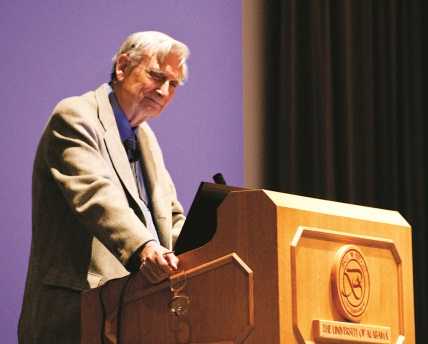 E.O. Wilson, a UA alumnus and two-time Pulitzer Prize winner, began his “Biodiversity and the Future” lecture Tuesday night by showing a picture of Charles Darwin.
E.O. Wilson, a UA alumnus and two-time Pulitzer Prize winner, began his “Biodiversity and the Future” lecture Tuesday night by showing a picture of Charles Darwin.
Wilson said he decided to begin the lecture with the picture because last year was the bicentennial of Darwin’s birth and the 150th anniversary of the creation of Darwin’s best-known work, “The Origin of Species.”
Wilson pointed out that many people are going green, but he also said people need to focus on biodiversity, which doesn’t receive enough attention.
“If you save the living environment, you will save the physical environment,” Wilson said. “But if you save only the physical environment you will lose them both.”
Wilson presented an illustration entitled “The Species-Scape,” which represents the number of each species existing by the size of the creature illustrated. The beetle, for example, was larger than any other species represented because it symbolized insects, which are more numerous than mammals or fungi.
Wilson said the amount of biodiversity on earth is greater than anyone knows. Wilson said scientists currently estimate that 1.9 million species exist on earth, but no one is certain of any number that is even close to the actual number of species on earth.
“It could be 15 million, or it could be 100 million,” Wilson said.
Wilson said nematodes, also known as ringworms, are vital to humans for advancement of medicines. Scientists know of approximately 20,000 species of nematodes, but the actual number could be in the millions, he said.
“Once you have seen one of these nematodes, you certainly have not seen all of them,” Wilson said.
Wilson said about 10,000 species of bacteria are known to mankind, and all are vital to human health.
“One gram of garden soil contains an estimated one billion bacteria, and that one billion bacteria represents 5,000 to 6,000 species,” Wilson said.
Wilson said viruses are known as gene weavers because they contain more genes than any other organism.
Wilson said the tropical rainforests, which cover about 6 percent of the planet, contain the majority of the species that exist on earth.
“Destruction of the tropical rainforests is driving down biodiversity,” Wilson said.
Wilson said some scientists climb 80-100 feet into the canopy of a rainforest to explore unknown species, and climbing into the canopy takes a great deal of courage and athleticism. Wilson said scientists have begun to use a new way to study the canopy: a canopy crane, which allows scientists to reach the treetops to study without climbing.
Wilson said anyone could study biodiversity because it is not contained in the rainforests. Wilson said he made his first discovery in his hometown of Mobile.
Wilson said the tragedy of biodiversity is that humans destroy millions of ecosystems before anyone can discover their existence.
Wilson noted some of the species that have recently become endangered or extinct. Wilson said the Ivory-billed and Imperial Woodpeckers as well as the Golden Toad are now extinct.
And he said humans have added to the extinction of species. Before humans existed, Wilson said the baseline extinction rate was about one species every million years. Wilson said humans have increased that extinction rate while decreasing the appearance of new species.
“It will take about 5 million years for evolution to replace what humans destroy,” Wilson said.
Taylor Roberge, a student at UAB, said Wilson’s lecture was poignant because the subject is the hot topic right now. Roberge said people should take to heart what Wilson said before it is too late.
“He made very good points that we need to take into account,” Roberge said.
Jennifer Schieltz, a research technician in the biology department, said she agrees with Wilson that people often forget about the decline of species.
“It’s time for people to really start thinking about conservation,” Schieltz said.







